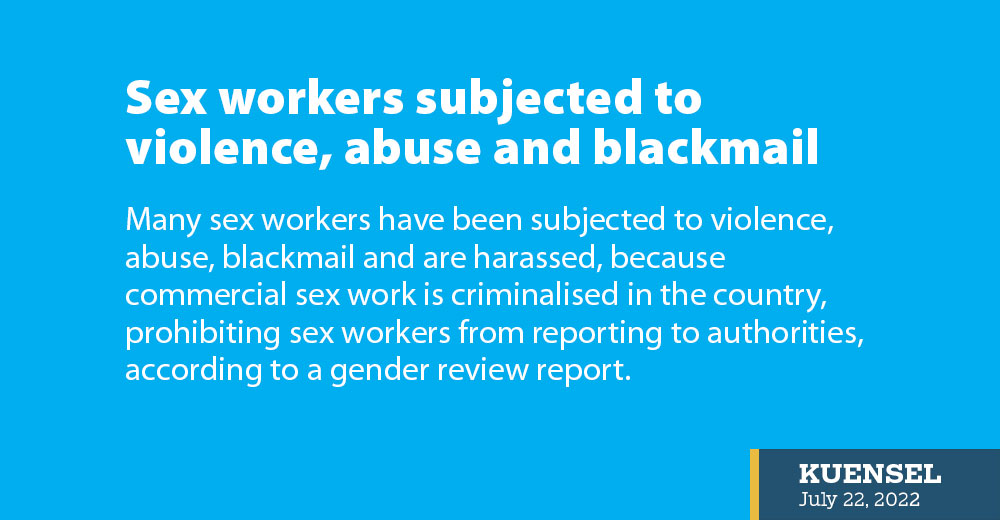It is estimated that there are about 400 sex workers in the country
Dechen Dolkar
Many sex workers have been subjected to violence, abuse, blackmail and are harassed, because commercial sex work is criminalised in the country, prohibiting sex workers from reporting to authorities, according to a gender review report.
The study conducted in 2019 by Save the Children, but made available to media only recently stated that commercial sex is taking place in all major towns and clients threaten sex workers of reporting to police when they do not agree to their unusual demands. “Most sex workers are fearful of the law and remain hidden,” the report stated.
While there are about 400 commercial sex workers in the country, according to Bhutan key population size estimation report, 84 workers are registered with a community-based organisation working closely with them.
As per the report, there are about 100 sex workers in Thimphu , followed by 77 in Chukha and 54 in Sarpang. It also stated there are 31 in Paro, 28 in Mongar, 21 in Wangduephodrang and 21 in Samtse.
Sources claimed it is mostly women aged between mid-20s and mid-30s working as sex workers.
Similarly, Save the Children also conducted another report on advocacy and strategy plan to reduce stigma and discrimination among key populations in Bhutan where sex workers reported that clients refused to pay and block their numbers to avoid being called.
A sex worker told interviewers that clients pretend to go to the toilet and invite their friends who then rape them.
“Police make fun of us when we are caught. They share our pictures among themselves and ask us our rates,” sex workers have told the interviewers. “Some clients threaten us to leak video clips if we don’t have sex with their friends.”
The report stated that some students are also involved in sex work and they are highly hidden. “They mainly do it for pocket money and college shopping.”
The report categorised sex work as transactional, which works in entertainment venues and informal which operates from homes. Pimps arrange clients for informal sex workers.
It also stated that sex workers are also afraid of availing of health services, they also lack condom negotiation skills and agree to have sex without condoms when clients pay more. “Sex workers also face policy barriers as abortion is illegal and they cannot send their child for adoption since they are unable to trace the father of their child.”
Sex workers do not talk to media due to social barriers and legality issue.
Sources said sex workers are not interested in advocacy and awareness, limiting knowledge on HIV and other issues due to the criminalisation, associated guilt and social judgment.
Meanwhile, reports also state the number of sex workers has increased, but most are hidden. It states some sex workers are from well-to-do family backgrounds.
It claimed socio-economic factors have forced people into sex work, but some are influenced by friends and once they are inside, it is difficult to come out since they make easy money.
“Most sex workers are driven by financial circumstances to join the profession and continue doing it whenever they need money to keep up with the urban lifestyle,” the advocacy report stated. “Many students also engage in seasonal sex work to support their education.”
It stated most sex workers use mobile phones to connect with clients and pimps also engage in arranging clients who take a cut. “Most sex workers have low level of education.”


